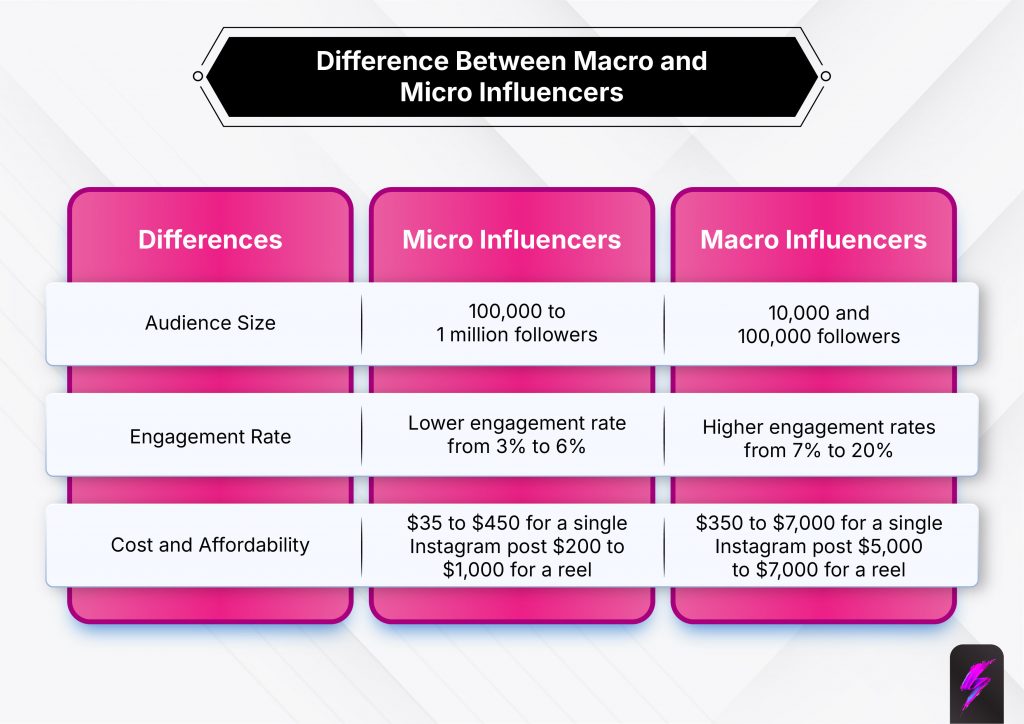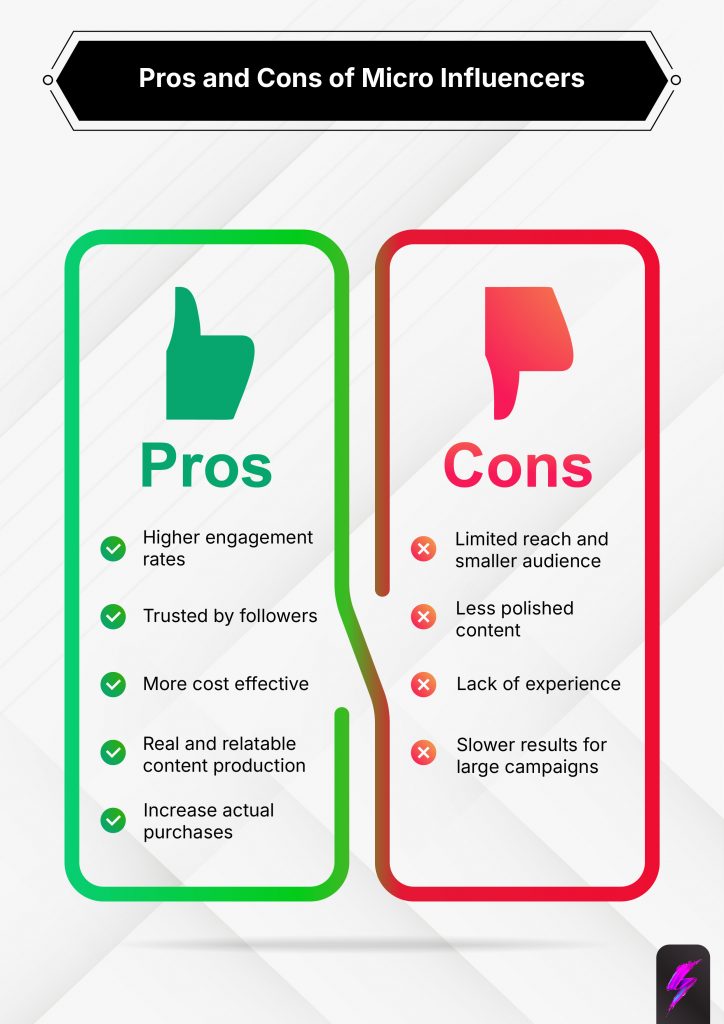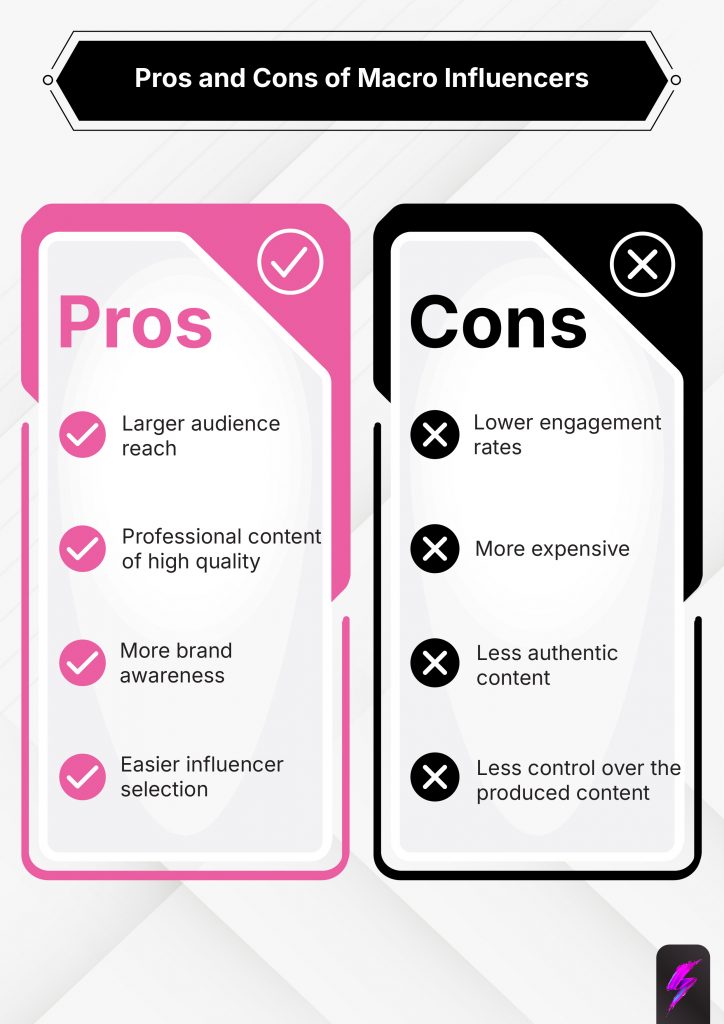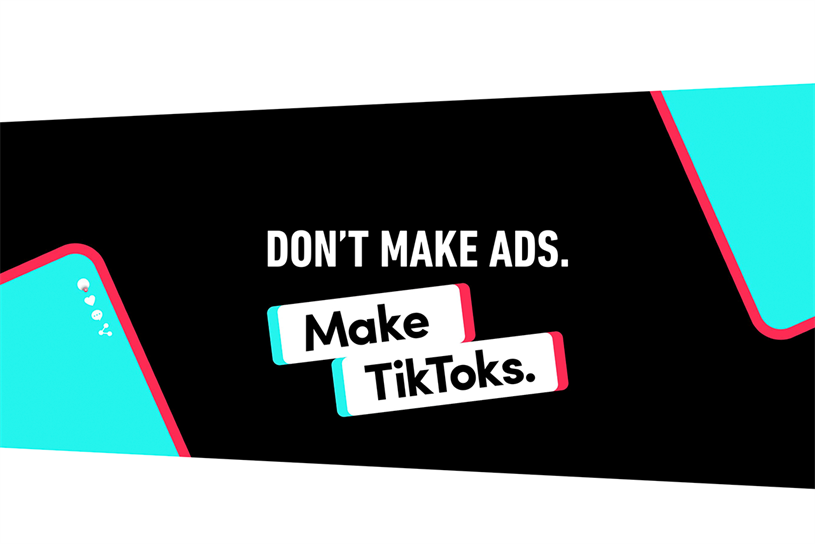Micro vs Macro Influencers: Differences, Pros, Cons, and How to Choose







Micro‑influencers are content creators with an average amount of following that is between 10,000 and 100,000 people. They focus on a specific niche like sustainable fashion, local trends, or fitness, and their audiences see them as relatable and trustworthy.
Macro-influencers are content creators with larger audiences that range from 100,000 to more than 1 million followers. They are more recognized and are sometimes considered celebrity influencers. Macro influencers have more experience in promoting brands and their products, and also provide a large-scale engagement.
Micro and macro influencers differ in terms of audience size, engagement rate, and cost and affordability.
Micro influencers offer higher engagement rates, stronger audience trust, niche authority, cost-efficient campaigns, and more authentic content that drives better conversions. Macro influencers, in contrast, provide wider reach, polished content, quicker brand awareness, and are generally easier to identify and work with.
The disadvantages of micro influencers include limited reach, less polished production, and may lack experience for large campaigns, while macros bring lower engagement, higher costs, and content that can feel less authentic with reduced brand control.
What Are Micro Influencers?
Micro influencers are content creators with 10,000 to 100,000 followers who operate in focused niches such as fitness, gaming, fashion, or beauty. Their main advantage is engagement, because on most social media platforms they achieve two to four times higher engagement rates than larger influencers. This level of interaction builds stronger trust with audiences and increases the likelihood of influencing purchase decisions.
Brands work with micro influencers for three core reasons. First, their content feels authentic because audiences view them as peers rather than polished celebrities. Second, they are cost efficient because campaigns often deliver a lower cost per engagement compared to macro or celebrity partnerships. Third, they produce user generated content that brands can repurpose across ads, social media feeds, and other channels, which reduces production costs while maintaining a natural look and feel.
Brands face operational challenges when scaling campaigns with micro-influencers because coordinating dozens or hundreds of creators requires structured workflows for discovery, vetting, contracting, and performance tracking. Brands use influencer marketing platforms or partner with specialized influencer marketing agencies to manage this complexity.
What Are Macro Influencers?
Macro influencers are creators with audiences ranging from 100,000 to more than one million followers on platforms such as Instagram, YouTube, and TikTok. They operate at a professional level and have access to advanced resources unlike smaller creators, including high-quality equipment, editing software, and in some cases entire production teams. This level of support allows them to consistently produce polished and brand-ready content that fits into large-scale influencer campaigns.
The main value of macro influencers for brands lies in their ability to deliver reach at scale. They are used for national or international awareness campaigns, major product launches, or moments when rapid visibility is essential. Campaign costs are also higher for macro influencers which makes them a less efficient choice for brands that are primarily focused on conversions or cost-per-engagement.
What Is the Difference Between Macro and Micro Influencers?

The difference between macro and micro influencers lies in the audience size, engagement rate, and cost and affordability. Micro influencers are budget-friendly and ideal for brands looking for meaningful interactions with targeted audiences, while macro influencers are the best fit for influencer campaigns that prioritize visibility and scale.
The three main differences between macro and micro influencers are described below.
- Audience Size
- Engagement Rate
- Cost and Affordability
1. Audience Size
Audience size defines the scale of influence and the potential reach an individual creator can deliver for a brand. Macro influencers build audiences that range from 100,000 up to one million followers across platforms such as Instagram, YouTube, or TikTok. Their larger reach allows them to speak to broad audience segments and generate more visibility, which is why they are selected for awareness-driven influencer campaigns. While many macro influencers develop a level of recognition within their niches, it is their ability to mobilize large audiences at once that makes them appealing to brands.
Micro influencers, on the other hand, maintain communities of 10,000 to 100,000 followers. The reach of micro influencers is smaller, but the strength of their influence lies in the closer and more personal connections they build with their audiences. Micro influencers are effective at engaging highly targeted groups and shaping consumer decisions within specific niches, because their content is perceived as authentic and relatable.
2. Engagement Rate
Engagement rate refers to the percentage of an influencer’s audience that actively interacts with their content through likes, comments, shares, or saves. Macro influencers have high following counts but lower engagement rates, ranging from 3% to 6%. This is because they have a large audience but lack a personal connection with their followers.
Micro influencers have higher engagement rates that range from 7% to 20%. The higher engagement rates of micro influencers are due to their sense of community and trust. This makes them valuable for brands looking to get conversions and meaningful conversations.
3. Cost and Affordability
Cost and affordability refer to how much brands need to pay to collaborate with an influencer and whether it fits within their marketing budget. Most macro influencers have a celebrity status, so they cost more and charge between $350 and $7,000 for a single Instagram post or $5,000 to more than $7,000 for a reel. They also have a high cost per engagement, which averages around $0.33.
Micro influencers are more budget-friendly as they only charge $35 to $450 for a single Instagram post or $200 to $1,000 for a reel. They are ideal for small and medium-sized businesses that want to target highly engaged audiences without overspending.
What Are the Pros and Cons of Micro Influencers?

The pros of micro influencers include higher engagement rates, strong audience trust, cost-effective, authentic, and relatable content, and higher conversion rates. On the other hand, cons include a limited reach, less polished content, a lack of experience, and slower results for large campaigns.
Pros of Micro Influencers
The key advantages of working with micro influencers are given below.
- Micro influencers achieve higher engagement rates and generate more likes, comments, and shares than macro influencers.
- The followers of micro influencers trust them more because these influencers have deep connections with their audiences.
- The influencer marketing campaigns of micro influencers are more cost-effective for brands that are on a budget.
- Micro influencers create authentic and personal content that feels more real and relatable to the audience.
- Product recommendations of micro influencers are more likely to convert into actual purchases because their audiences find them more relatable and trustworthy compared to larger influencers.
Cons of Micro Influencers
The disadvantages of micro influencers are given below.
- Micro influencers have limited reach and smaller audiences which makes it harder to reach a wide number of people at once.
- The content of micro influencers is less polished and lacks the professional quality seen in larger influencer campaigns.
- Micro influencers are new to brand deals and may struggle with influencer campaign requirements due to a lack of experience.
- Micro influencers sometimes take longer to generate measurable impact which leads to slower results for large influencer marketing campaigns.
What Are the Pros and Cons of Macro Influencers?

The pros of macro influencers includea large follower base, professional content quality, the ability to create faster brand awareness, and the availability of public performance data that makes selection easier. However, the cons include lower engagement rates, higher costs, less authentic content, and reduced brand control over content style.
Pros of Macro Influencers
The advantages of working with macro influencers are given below.
- Macro influencers have audiences ranging from 100,000 up to around one million followers which allows them to reach large segments of consumers in a single influencer campaign.
- Macro influencers produce content that is supported by advanced equipment, editing skills, or even dedicated production teams which allows them to attract large audiences.
- Macro influencers help brands that need rapid visibility and broad awareness which makes them effective for large-scale product launches or nationwide influencer campaigns.
- Macro influencers are easier to evaluate during the selection process because their larger presence comes with accessible performance data and case studies from past brand partnerships.
Cons of Macro Influencers
- Macro influencers have large audiences, which leads to no interactions or personal connections and lower engagement rates.
- Hiring macro influencers is more expensive as it requires a higher marketing budget.
- There is less authenticity in the content of macro influencers as it feels more commercial and less relatable to the audience.
- The brand has less control over the content produced by macro influencers, as the influencers like to follow their own style.
How to Choose Between Micro and Macro Influencers?
To choose between micro and macro influencers, you need to decide your campaign goals, determine the budget, understand your target audience, decide the content quality needs, and consider the timeline and scale.
The steps to choose between micro and macro influencers are described below.
- Decide your Campaign Goals: Decide your influencer marketing campaign goals, like brand awareness, sales conversion, engagement, or community building, to select the best influencer.
- Determine the Budget: Determine the budget of your influencer marketing campaign, as it helps you decide the type of influencer you can spend your money on. Micro influencers are more cost-effective, while macro influencers require larger budgets.
- Understand your Target Audience: Understand your target audience and identify the type of people you are trying to reach. Micro influencers are best for reaching audiences in niche markets, and macro influencers allow more broader reach across multiple social platforms.
- Decide the Content Quality Needs: Consider the level of content quality and production value required for large-scale influencer campaigns versus niche community activations. Macro influencers create high-quality and professional content, while micro influencers create content that feels more real and relatable.
- Consider the Timeline and Scale: Consider the timeline and scale of micro and macro influencers to see how much your brand is willing to wait for results and how many people you want to reach with it. Macro influencers deliver fast results and offer large-scale campaigns, while micro influencers only attract a small-scale audience and show results gradually.
When Should You Work With Micro Influencers?
You should work with micro-influencers when you are promoting a niche product, want strong trust and engagement, want to experiment more, or have a limited budget. These micro influencers help reach smaller and more loyal audiences, which helps you test campaigns without high costs.
When Should You Work With Macro Influencers?
You should work with macro-influencers when you want broad reach, fast brand awareness, and quick impact. They are perfect for big campaigns that need to reach a wide audience in a short time.
Which Type of Influencer Maximizes Your Marketing Budget?
Micro influencers maximize your marketing budget, as they provide higher engagement at a lower cost if you are looking to target niche buyers. Macro-influencers are only better if your goal is to increase brand awareness and reach large audiences quickly.
Which Type of Influencer Among Micro and Macro Delivers Better ROI?
Micro influencers deliver better ROI because they offer higher engagement rates, stronger audience trust, and better conversion rates at a lower cost. Return on investment (ROI) in influencer marketing means how much value or profit a brand gets from the money spent on influencers.
Are Micro-Influencers a Smarter Investment Than Macro Influencers?
Yes, micro influencers are a smarter investment than macro influencers for most businessesif their goal is to promote a specific product, stay within budget, or run a targeted influencer marketing campaign. They help brands build trust with the audience, increase product sales, and provide better engagement rates.
How Much Does a Micro Influencer Cost?
A micro influencer costs between $100 and $5,000, depending on the platform and the type of content posted. An Instagram post costs around $100 to $1,000, an Instagram story ranges between $150 and $750, a TikTok video costs between $50 and $800, and a full YouTube video costs around $200 to $5,000.
How Much Does a Macro Influencer Cost?
A macro influencercosts around $5,000 to $20,000, depending on the platform and the type of content posted. An Instagram post costs around $500 to $10,000, an Instagram story ranges between $3,750 and $7,500, a TikTok video costs between $4,000 and $8,000, and a full YouTube video costs around $10,000 to $20,000.
Why Should You Invest in Influencer Marketing?
You should invest in influencer marketing because it helps brands connect with consumers in a more personal and trustworthy way. Many Influencers have loyal followers which makes the brand’s messages and promotions feel more genuine.
Influencer marketing benefits businesses because it allows them to build trust, reach specific or broad audiences, and increase brand visibility and conversions.
What Are the Other Types of Social Media Influencers?
The other types of social media influencers are mega influencers and nano influencers. Mega influencers have over 1 million followers and are also considered celebrities or well-known internet personalities. They have a large reach but are very expensive. Nano influencers are small creators with fewer than 10K followers. They usually have high engagement and strong trust with their small and local audience.
We'll show you how to start powerful conversation, drive social engagement, build your brand, hit sales targets or meet other goals you have, wherever you are in the world.
Work with us






















